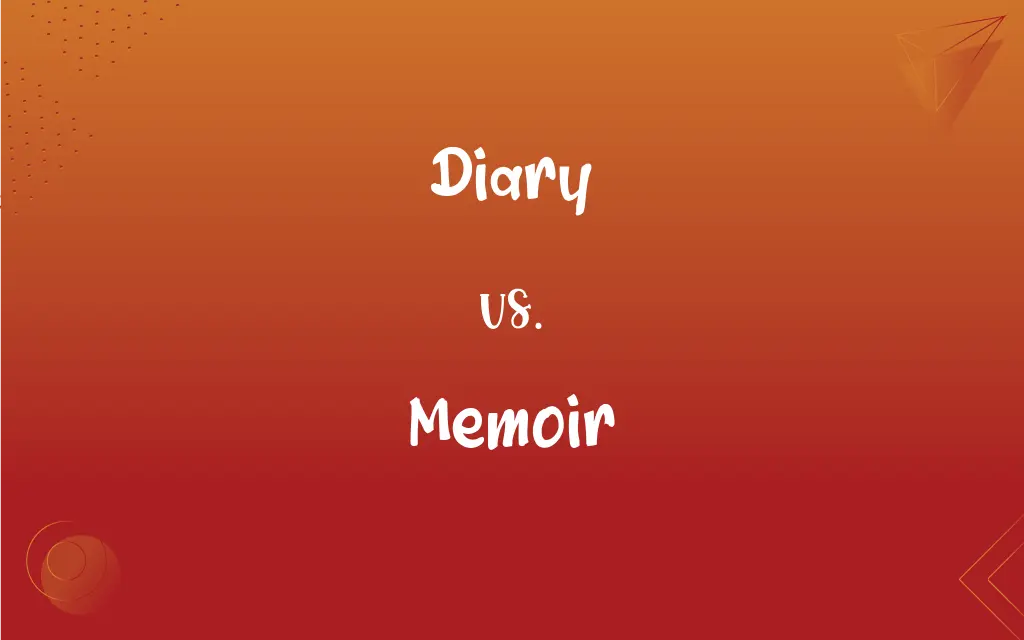Diary vs. Memoir: What's the Difference?
Edited by Aimie Carlson || By Janet White || Updated on October 11, 2023
A daily record of personal experiences and thoughts. A narrative composed from personal experience.

Key Differences
A diary is fundamentally a record of occurrences, experiences, and reflections kept on a regular basis, often daily. It is inherently personal and may contain not only experiences and reflections but also thoughts, feelings, and impressions. On the other hand, a memoir is a subgenre of narrative writing where an author recounts experiences from their life, often highlighting impactful events or periods, which may be shared selectively and not as consistently or methodically as a diary.
A diary is typically intended for the writer’s eyes only, encapsulating intimate details, secrets, and raw expressions without the constraint of an external audience. In contrast, a memoir is usually written with an audience in mind, providing a retrospective account that extracts meaning or insight from the author's experiences, making it less about the intimate daily details and more about a thematic or episodic exploration of the past.
When considering chronology, diaries emphasize consecutive and consistent entries, maintaining a linear and unbroken record of the writer’s thoughts and actions. Memoirs might leap through time periods, focusing on significant moments or episodes without the necessity of maintaining a strict chronology, thereby providing a non-linear account of past events.
The structural and stylistic approach to writing a diary leans towards spontaneity and immediacy, capturing the "in the moment" emotions and occurrences. Memoirs involve a level of reflection, narrative shaping, and often, a degree of literary crafting, ensuring that the recounted experiences convey broader themes or messages.
Diaries may be indiscriminate regarding the significance of logged events, ranging from mundane to monumental instances. Memoirs, conversely, are selective and purposeful in the events they recount, often focusing on moments of transformation, learning, or pivotal experiences in the author’s life.
ADVERTISEMENT
Comparison Chart
Intended Audience
Generally private and personal.
Intended for public reading and sharing.
Temporal Structure
Chronological and consistent.
May be non-linear and selective.
Purpose
To record daily thoughts and events.
To convey insights or themes from past experiences.
Content
Contains everyday details, both trivial and important.
Focuses on significant, transformative events.
Style
Often informal and spontaneous.
Typically crafted with literary intentionality.
ADVERTISEMENT
Diary and Memoir Definitions
Diary
A diary serves as a chronicle, marking the events and emotions of each passing day.
The archaeologists discovered an ancient diary, revealing the daily life of a long-lost civilization.
Memoir
A memoir is a personalized historical account that offers insights and reflections upon past experiences.
Her memoir wove a rich tapestry of stories from her travels across the globe.
Diary
A usually daily written record of personal experiences and observations; a journal.
Memoir
A memoir is a written record, wherein an individual reflects on moments that were impactful to their life journey.
The activist’s memoir became a powerful text for those advocating for social change.
Diary
A diary is a personal, often daily, record of experiences and feelings.
Her diary was filled with stories of adventures and tales of sorrow.
Memoir
A memoir usually presents a narrative that seeks to understand, interpret, or make sense of past events.
Her memoir sought to untangle the threads of her past, offering readers a glimpse into her transformative journey.
Diary
A diary acts as a confidential space where one’s innermost thoughts are stored.
He opened his diary and poured all his secret dreams onto the pages.
Memoir
An account of the personal experiences of an author.
Diary
A diary is often a handwritten journal used to document personal and historical events.
The diary, bound in weathered leather, held the memories of her youthful days.
Memoir
Often memoirs An autobiography.
Diary
A daily record of events or measurable phenomena, usually kept to track patterns over time
Kept a diary of blood sugar levels.
Memoir
A biography or biographical sketch.
Diary
A book or computer file used for keeping such a record.
Memoir
A report, especially on a scientific or scholarly topic.
Diary
A daily log of experiences, especially those of the writer.
They kept separate diaries. His was on paper and her diary was on her computer's hard drive.
Memoir
Memoirs The report of the proceedings of a learned society.
Diary
A personal organizer or appointment diary.
Memoir
An autobiography; a book describing the personal experiences of an author.
When I retire, I'm going to write my memoirs.
Diary
(obsolete) Lasting for one day.
Memoir
A biography; a book describing the experiences of a subject from personal knowledge of the subject or from sources with personal knowledge of the subject.
James wrote a memoir of his grandmother shortly after she passed away.
Diary
(intransitive) To keep a diary or journal.
Memoir
Any form of narrative describing the personal experiences of a writer.
Diary
A register of daily events or transactions; a daily record; a journal; a blank book dated for the record of daily memoranda; as, a diary of the weather; a physician's diary.
Memoir
A memorial account; a history composed from personal experience and memory; an account of transactions or events (usually written in familiar style) as they are remembered by the writer. See History, 2.
Diary
Lasting for one day; as, a diary fever.
Memoir
A memorial of any individual; a biography; often, a biography written without special regard to method and completeness.
Diary
A daily written record of (usually personal) experiences and observations
Memoir
An account of something deemed noteworthy; an essay; a record of investigations of any subject; the journals and proceedings of a society.
Diary
A personal journal (as a physical object)
Memoir
An account of the author's personal experiences
Diary
A diary may function as a planner, where one organizes their upcoming tasks and appointments.
His diary was meticulously organized, reflecting his attention to detail and love for planning.
Memoir
An essay on a scientific or scholarly topic
Memoir
A memoir is a retrospective narrative that recounts significant events or periods from someone’s life.
The soldier’s memoir provided a harrowing look into the realities of war.
Memoir
A memoir is a biographical account, often focusing on personal, rather than external, historical events.
His memoir, while touching on historical events, centered mostly on his own personal journey.
FAQs
Are "Memoirs" usually crafted for an audience?
Yes, memoirs are written with an audience in mind, aiming to share personal insights and stories.
What is a "Diary"?
A diary is a personal record, typically kept daily, which documents experiences, thoughts, and emotions.
How is a "Memoir" defined?
A memoir is a narrative, often a book, where an individual recounts and reflects upon significant events or periods from their life.
How does the timeline work in a "Memoir"?
Memoirs may not follow a strict chronological order and often focus on key moments or periods rather than providing a day-to-day account.
Can a "Diary" discuss future events or plans?
Yes, a diary can include future plans, aspirations, or scheduled events, serving also as a personal planner.
Is a "Diary" always written for every day?
Not necessarily. While diaries are often associated with daily entries, they can be written as frequently or infrequently as the writer chooses.
Can a "Memoir" be written by someone else?
Generally no, as memoirs are personal accounts, but they can be ghostwritten if based closely on a person’s recounted experiences and thoughts.
Is a "Diary" typically intended for public reading?
No, diaries are generally private and intended primarily for the writer.
Can a "Diary" be published?
Yes, diaries can be published, often posthumously or with the consent and editing of the writer, becoming available for public reading.
What is the main purpose of a "Memoir"?
The primary purpose of a memoir is to share personal experiences and insights with readers, often involving reflection on historical or cultural events.
Can a "Memoir" include fictional elements?
While memoirs are grounded in truthful experiences, creative liberties can sometimes be taken for narrative flow or privacy.
Can a "Memoir" focus on a single event?
Yes, a memoir can center around a singular, significant event, providing detailed reflections and perspectives on it.
Is there a typical structure to follow in a "Memoir"?
While there’s no strict structure, memoirs often follow a narrative arc, exploring key experiences with introspection and reflection.
Does a "Diary" require a formal writing style?
No, diaries typically embrace an informal writing style, capturing authentic and spontaneous thoughts.
Are "Diaries" only concerned with the past?
No, diaries often contain reflections on the present and thoughts or plans for the future.
Can a "Diary" include drawings or doodles?
Absolutely. Diaries can include sketches, doodles, and other personal mementos.
Can a "Diary" be written in digital format?
Yes, diaries can be written in physical books, digital apps, or online platforms.
Can "Diary" entries be edited or refined over time?
They can be, but diaries typically preserve the original thoughts and emotions from the entry's date.
Do "Memoirs" share the author’s life lessons?
Often, yes. Memoirs typically present the author's reflections and learned lessons from their experiences.
How long is a typical "Memoir"?
Length can vary, but memoirs are often substantial enough to explore key life events and reflections in depth.
About Author
Written by
Janet WhiteJanet White has been an esteemed writer and blogger for Difference Wiki. Holding a Master's degree in Science and Medical Journalism from the prestigious Boston University, she has consistently demonstrated her expertise and passion for her field. When she's not immersed in her work, Janet relishes her time exercising, delving into a good book, and cherishing moments with friends and family.
Edited by
Aimie CarlsonAimie Carlson, holding a master's degree in English literature, is a fervent English language enthusiast. She lends her writing talents to Difference Wiki, a prominent website that specializes in comparisons, offering readers insightful analyses that both captivate and inform.































































